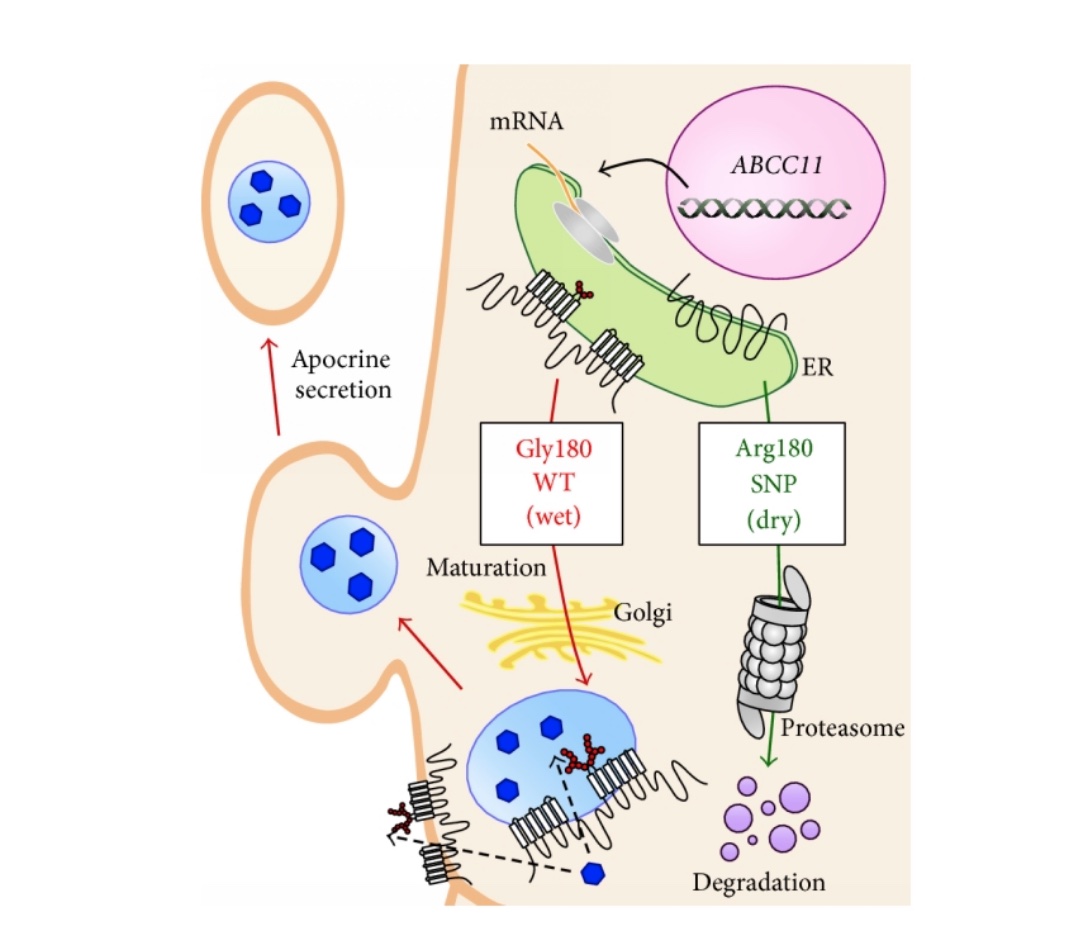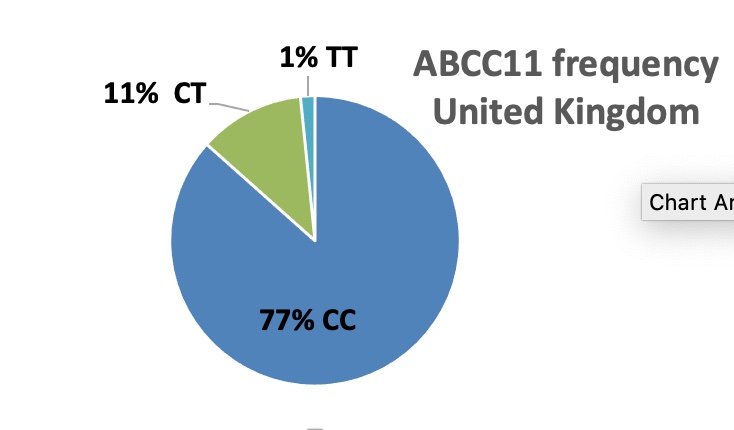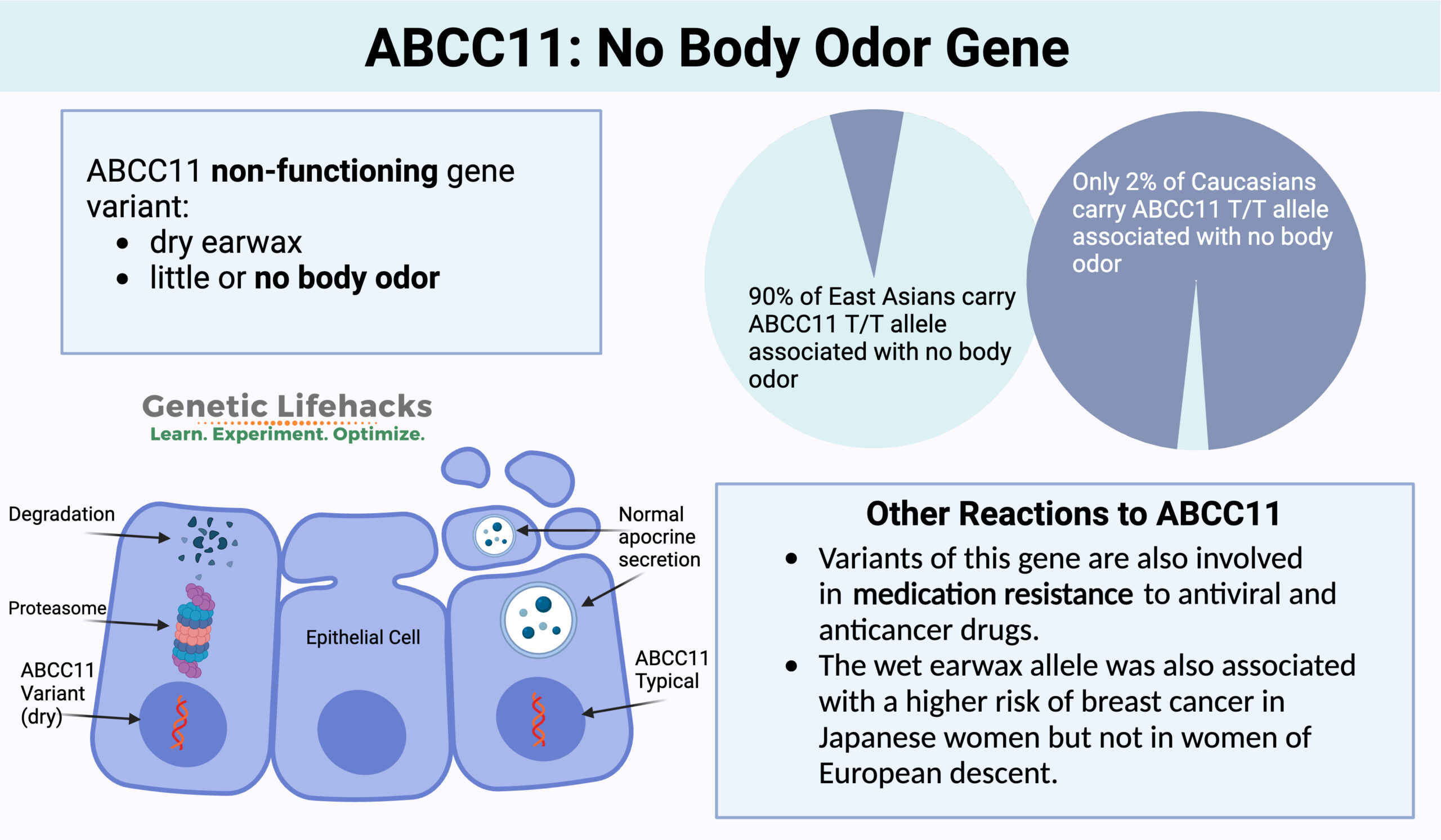Key takeaways:
~ The ABCC11 gene determines both the type of earwax a person has and their armpit odor.
~ A single change in the DNA of this gene can cause it to stop functioning, resulting in a lack of body odor.
~ You can check your 23andMe, AncestryDNA, or other raw data file to see which version of ABCC11 you have.
Members will see their genotype report below, plus additional solutions in the Lifehacks section. Consider joining today.
ABCC11: the “no body odor gene”
In a nutshell:
- People with the ABCC11 non-functioning gene variant have dry earwax and little or no body odor.
- People with a functioning ABCC11 gene usually have wet earwax and body odor.
Genetic variants that cause a loss of function of the ABCC11 gene are very common among East Asian ethnicities (80-90% of the population).
In other population groups, it is rare to have no body odor. In fact, only around 2% of Caucasians carry the ‘no body odor’ version of the gene.
What does the ABCC11 gene do?
The ABCC11 gene (ATP-binding cassette transporter, sub-family C member 11) encodes a protein involved in transporting molecules across cellular membranes.

ABCC11 is required for the transport of lipophilic substances, bile acids, conjugated steroids, and – most importantly – the component found in apocrine sweat and earwax, which results in odor and wet earwax. One component of sweat that can be secreted with the help of ABCC11 is an odorless S-glutathione conjugate.
No body odor:
The transporter doesn’t work for people who have loss-of-function genetic variants and thus doesn’t transfer the S-glutathione conjugate to their armpit skin when they sweat.
Bacteria are the cause of body odor. The S-glutathione conjugate is used by certain types of bacteria, and the change in what is transported in the sweat means that different bacterial species can survive. The bacteria that utilize the S-glutathione conjugate produce a thiol molecule that gives you a sweaty odor. People who have the ABCC11 loss-of-function variant don’t have the bacteria on their skin.[ref] Want to know more about the details? Here’s a great new study on it.
Body odor:
The more common version of the ABCC11 gene that causes body odor also causes an increase in sweat from the armpits.[ref] The Staphylococcus hominis bacteria can then use the S-glutathione conjugate to produce the pungent thiol compound that gives your sweat the distinctive smell.
Thus, if you have the loss-of-function variant, you may have less sweaty armpits than someone who has the functioning version of the gene.
What else is this gene important for?
Variants of this gene are also involved in medication resistance to antiviral and anticancer drugs.[ref]
The wet earwax allele was also associated with a higher risk of breast cancer in Japanese women but not in women of European descent.[ref][ref][ref]
In Japanese men, carrying the allele associated with wet earwax is linked with an increased risk of hidradenitis suppurativa.[ref] Hidradenitis suppurativa is a painful skin condition causing pus-filled lumps under the skin, usually in the underarms, buttocks, or groin areas.
Do you need to wear deodorant if you have the ABCC11 ‘no stink’ variant?
In general people with the non-functioning ABCC11 variant don’t need to wear deodorant.
A few years ago, Scientific American published an interesting piece about how people who genetically don’t have smelly pits often unnecessarily still wear deodorant.[ref]
Other research showed that those with the ‘no body odor’ variant sometimes had other sources of body odor or social reasons for wearing deodorant.[ref]
Genotype report: How to find your ABCC11 gene variant
Not a member? Join here. Membership lets you see your data right in each article and also gives you access to the member’s only information in the Lifehacks sections.
🖨 Printable Overview (Members)
ABCC11 gene:
Check your genetic data for rs17822931 538A>G (23andMe v4, v5; AncestryDNA):
- C/C: wet earwax, body odor, and normal colostrum[ref][ref]
- C/T: wet earwax, somewhat less body odor
- T/T: dry earwax, no body odor, and less colostrum
Members: Your genotype for rs17822931 is —.
The frequency of the alleles varies greatly according to ethnicity, with Asian ancestry having a much higher percentage with the no body odor variant.
For example, the vast majority of people with Korean ancestry have the T/T genotype with no body odor.
The flip side is that very few Caucasians in the UK have the T/T genotype:

In addition to the ‘no body odor’ variant, an additional variant in the gene is related to serious side effects from a certain chemotherapy drug. Keep in mind that the function of the ABCC11 gene is to transport certain molecules across the cell membrane. In this case, the variant causes the transport of the metabolite of a chemotherapy drug not to work correctly, increasing side effects.[ref]
Check your genetic data for rs17822471 (23andMe v4, v5):
- A/A: associated with 5-fluorouracil toxicity[ref][ref]
- A/G: associated with 5-fluorouracil toxicity
- G/G: typical
Members: Your genotype for rs17822471 is —.
Lifehacks:
Chemotherapy and cancer:
Changes in the ABCC11 gene may impact your reaction to a type of chemotherapy drug called fluorouracil.[ref] Talk with your doctor if you have concerns here.
Did you know? There’s a lot more you can learn from your genes :-) Check out the following topics next:
Diet and Supplements:
Access this content:
An active subscription is required to access this content.
Related Articles and Topics:
References:
Arlanov, R., et al. “Functional Characterization of Common Protein Variants in the Efflux Transporter ABCC11 and Identification of T546M as Functionally Damaging Variant.” The Pharmacogenomics Journal, vol. 16, no. 2, Apr. 2016, pp. 193–201. PubMed, https://doi.org/10.1038/tpj.2015.27.
Harker, Mark, et al. “Functional Characterisation of a SNP in the ABCC11 Allele – Effects on Axillary Skin Metabolism, Odour Generation and Associated Behaviours.” Journal of Dermatological Science, vol. 73, no. 1, Jan. 2014, pp. 23–30. PubMed, https://doi.org/10.1016/j.jdermsci.2013.08.016.
Ishiguro, Junko, et al. “A Functional Single Nucleotide Polymorphism in ABCC11, Rs17822931, Is Associated with the Risk of Breast Cancer in Japanese.” Carcinogenesis, vol. 40, no. 4, June 2019, pp. 537–43. PubMed, https://doi.org/10.1093/carcin/bgz005.
Ishikawa, Toshihisa, et al. “Pharmacogenetics of Human ABC Transporter ABCC11: New Insights into Apocrine Gland Growth and Metabolite Secretion.” Frontiers in Genetics, vol. 3, Jan. 2013, p. 306. PubMed Central, https://doi.org/10.3389/fgene.2012.00306.
Lang, Thomas, et al. “The Earwax-Associated SNP c.538G>A (G180R) in ABCC11 Is Not Associated with Breast Cancer Risk in Europeans.” Breast Cancer Research and Treatment, vol. 129, no. 3, Oct. 2011, pp. 993–99. PubMed, https://doi.org/10.1007/s10549-011-1613-0.
Magdy, Tarek, et al. “ABCC11/MRP8 Polymorphisms Affect 5-Fluorouracil-Induced Severe Toxicity and Hepatic Expression.” Pharmacogenomics, vol. 14, no. 12, Sept. 2013, pp. 1433–48. PubMed, https://doi.org/10.2217/pgs.13.139.
Matsumoto, Hirofumi, et al. “ABCC11/MRP8 Expression in the Gastrointestinal Tract and a Novel Role for Pepsinogen Secretion.” Acta Histochemica Et Cytochemica, vol. 47, no. 3, June 2014, pp. 85–94. PubMed, https://doi.org/10.1267/ahc.13040.
Miura, Kiyonori, et al. “A Strong Association between Human Earwax-Type and Apocrine Colostrum Secretion from the Mammary Gland.” Human Genetics, vol. 121, no. 5, June 2007, pp. 631–33. PubMed, https://doi.org/10.1007/s00439-007-0356-9.
Ota, Ikuko, et al. “Association between Breast Cancer Risk and the Wild-Type Allele of Human ABC Transporter ABCC11.” Anticancer Research, vol. 30, no. 12, Dec. 2010, pp. 5189–94.
Shibuya, Yuka, et al. “Earwax of Patients with Hidradenitis Suppurativa: A Retrospective Study.” Archives of Plastic Surgery, vol. 46, no. 6, Nov. 2019, pp. 566–71. PubMed, https://doi.org/10.5999/aps.2019.00290.
Toyoda, Yu, et al. “Diagnosis of Human Axillary Osmidrosis by Genotyping of the Human ABCC11 Gene: Clinical Practice and Basic Scientific Evidence.” BioMed Research International, vol. 2016, Feb. 2016, p. e7670483. www.hindawi.com, https://doi.org/10.1155/2016/7670483.

